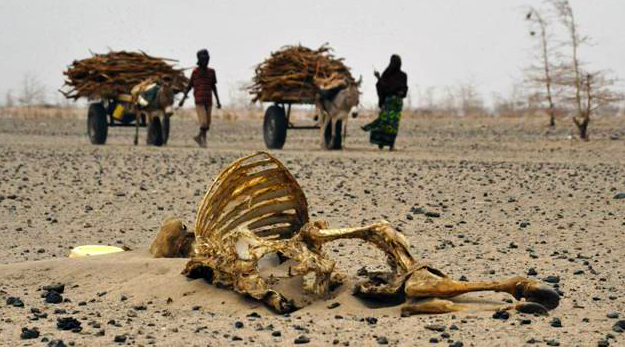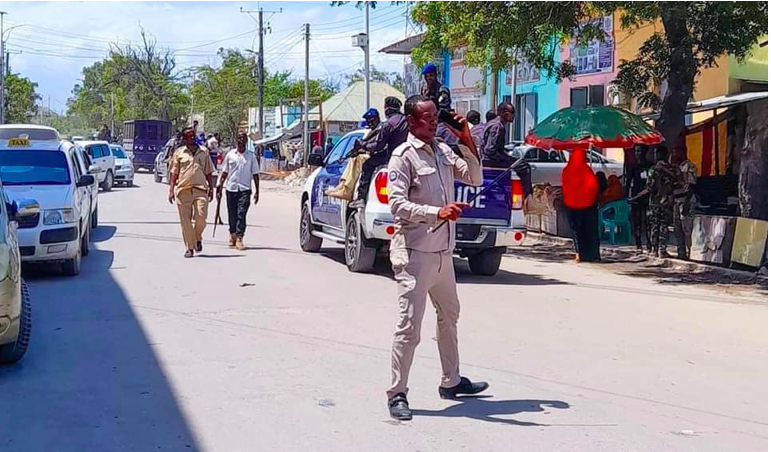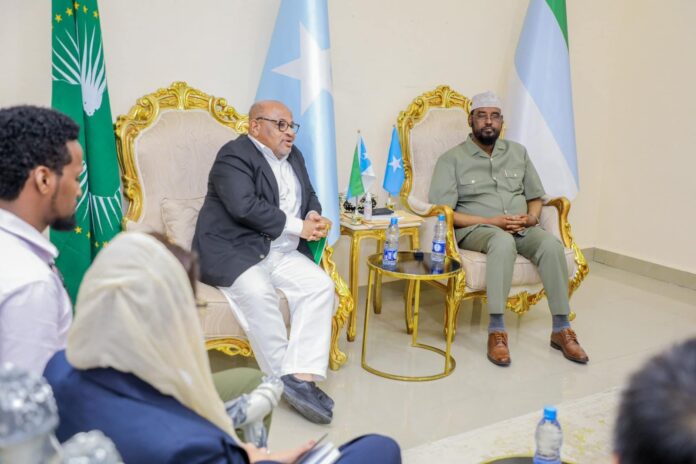By Faisal Mataan
Jubbaland, Somalia: Jubbaland is set to enter an electioneering period beginning from April in a bid to elect a new local assembly and regional president on August 2023.
This period could not have come at any worse time for Jubbaland region and the region at large due to the growing threat of international terrorism.
Tensions are still running among President Ahmed and opposition allied groups as the mandate of the president will expire on 29th August 2023.
Jubbaland shares a porous border of 681 kilometres (423 miles) with Kenya.
The communities in Jubbaland and Northeastern corridors of Wajir, Mandera and Garissa counties share identity and at this period of prolonged drought, movement across the border is heightened as pastoralists seek water and pasture for their livestock.
An unstable political situation, a growing threat of Al Shabab and the free flow of pastoralists is a recipe for disaster interms of cross-border terrorism activities.

While speaking in Mandera last week during the announcement to open the border between Kenya and Somalia at Mandera border post, the Cabinet Secretary for Interior and National Administration, Prof Kithure Kindiki noted an increase in movement of Al Shabab militants in the area.
The same was cited by Horizon Analysts and Researchers Network in Garissa on Monday last week, stating that the group has now deviced new tactics to recruit, operate and launch attacks particularly along the Lamu Port-South Sudan-Ethiopia-Transport (LAPSSET) project which has since been stalled due to the frequent attacks targeting the engineers of the Kenya National Highways Authority (KeNHA).
In the last two weeks, local media reported two instances where a multi-agency security team deployed to comb the area found hideouts, neutralised militants, arrested others and recovered materials used by the terror group, particularly in Garissa’s Fafi Constituency.
Since September last year, more than 25 lives were lost along the corridor where the ambitious project is ongoing.
What’s at Stake In Jubbaland Upcoming Polls?
In the 2019 controversial and shambolic election process held, the observers said Madobe severely defiled and significantly manipulated the election process. In the same breath, Kenya was severally accused of driving an agenda, seemingly in favour of Ahmed Madobe.
It was understandable then since Kenya was at loggerheads with Mogadishu over the maritime dispute but times have changed, seasons redefined and the results of the projected political stalemate could be far-reaching.
On the 23rd of April, 2020 at Nairobi in the Kenyan-brokered meeting between Ahmed Madobe and the Jubbaland Council for Change, some of the key terms that agreed upon were: that Madobe won’t seek re-election after end of the two-term limit and that he’s barred from meddling in the 2023 electoral process.
The Nairobi agreement is in harmony with with Article 70 of the Jubaland Constitution.
Three years after the pact and barely four months to the beginning of the process, no tangible development has been realised save for the thinning hope that the key issues discussed and agreed upon in the Nairobi declaration may likely not be implemented thus creating a stiff political standoff with far-reaching ripple effects.
Earlier this month, the Summit of Heads of State and Government of Somalia’s neighbouring countries of Djibouti, Ethiopia, and Kenya took place in Mogadishu.
This Summit was convened at the wake of the ongoing targeted and sustained campaign by the Somali Security Forces aimed at degrading the capability of all terrorist groups and diminishing their operational capability in the territory of the Federal Republic of Somalia.
The unprecedented campaign is anchored on the repudiation of Shabab by the public, the bold action of the Somali Security Forces and the strong political will of the federal government.

The Summit reviewed the conclusions of the conclave of Ministers of Defence and Chiefs of the Defence Forces of the neighbouring Frontline States on the importance of coordinated and timely technical, logistical, intelligence and operational support to the ongoing anti-terror operations along with the Somali National Army.
As several reports have already indicated, Al Shabab militants are moving towards the Middle Jubba. The group’s movement comes at the backdrop of an electioneering period in the area.
The question then begs: are the political actors in the Federal member State of Jubbaland in agreement on the modality and timelines of the upcoming polls?
Far from it due to several reasons.
Firstly, the opposition factions are demanding a complete implementation of the Nairobi pact; chiefly being a free electoral process that’s devoid of interference and the participation of Madobe, and to some extent, foreign interests because such move will significantly complicate and lengthen the process as well as shift the focus from the war on insurgency to solving—God forbid—an internal political squabble.
To prevent a political stalemate—a situation that can potentially stall the campaign to rid Shabab from the country, and avoid possible spillover of the militants onto the neighbouring countries—the International Community and other well-wishers are obligated to create a platform that will bring together President Madobe and Jubbaland Opposition groups in a bid to iron out the thorny issues ahead of the polls.
Presently, any observer assessing the trends and how things are looking can clear tell that Ahmed Madobe has not been exhibiting the goodwill required to honour the 2019 Nairobi pact, a fact that calls for alarm.
At this juncture, it’s paramount to note that the Somalia Government and International Community should be worried about a repeat of the 2019 Jubbaland elections-like scenes where the people’s will was trampled on and their freedom to choose a leadership of their own volition violently denied as documented.
In a democracy, safeguarding the people’s will is always superior to an individuals clout on power.
However, a mediated electoral process borne out of a roundtable agreement between Madobe and the Jubaland opposition groups is the only viable option to avoid unnecessary political conflicts for what we still have time and the necessary facilities to achieve a smooth political transition.
In the unfortunate event that the Constitutionally set election timeline is not met coupled with the expiry of the Ahmed Madobe’s two-term limit, the likelihood of the other candidates disregarding the poll outcome will become a reality, a situation that will see the opposition group declare it’s own administration leading to a complete disarray and end to the Kismayo administration.
The fallout will create a void that will facilitate Al Shabab to overrun the Jubaland administration and set up a launching pad and easily cross over to Northeastern for revenge attacks as Kenya is a member of a troop contributing country to ATMIS
An agreed upon political solution, ratified by all the warring factions in Jubbaland politics will allow attention to be solely on the fight against Al Shabab and see to the advancement of democracy and freedom of expression.
____________________________________________
The Author is a researcher Peace and political Reconciliation analyst in the Horn of Africa and a founding member of the Jubbaland Coalition for Change. He can be reached on dalka1898@gmail.com














